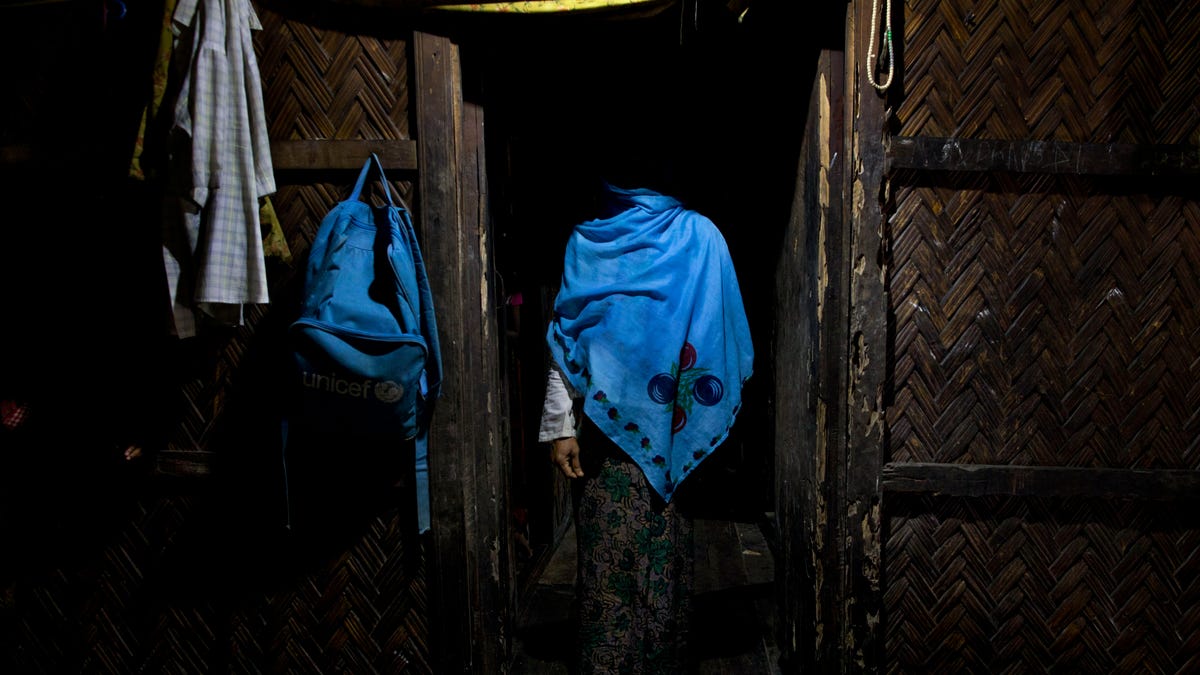
FILE - In this Sept. 15, 2013 photo, a woman who claims she was raped by Myanmar security forces stands in her home in Ba Gong Nar village, Maungdaw, northern Rakhine state, Myanmar. Myanmar's transition to democracy following five decades of brutal military rule has won widespread international praise, but rights’ groups say little has changed in resource-rich border areas, where the army continues to grapple with stubborn ethnic insurgencies. As in the past, the use of sexual violence against civilians is widespread and systematic, said Tin Tin Nyo, general secretary of the Women's League of Burma. (AP Photo/Gemunu Amarasinghe, File) (The Associated Press)
YANGON, Myanmar – A soldier in full uniform saw the 7-year-old in her front yard soon after her parents left to tend to their rice paddies in Myanmar's restive state of Shan. She said he ordered her inside the family's bamboo hut.
"He hit me and told me to take off my clothes," the girl told the tightly packed courtroom in a whisper, as her alleged assailant, Maung Win Htwe, looked on, stone-faced.
"Then ... he raped me."
Rights activists in Myanmar, also known as Burma, say the army continues to use rape as a weapon of war nearly three years after President Thein Sein's nominally civilian government ended a half-century of brutal military rule. On Tuesday, the Women's League of Burma released a report documenting more than 100 rapes, almost all in townships plagued by stubborn ethnic insurgencies.
Nearly half were brutal gang rapes, several of the victims were children, and 28 of the women were killed or died from their injuries, said Tin Tin Nyo, the league's general secretary. She warned that there is little hope for change until the government amends Myanmar's constitution, which gives the military the right to independently administer all its affairs.
Ye Htut, the government's top spokesman, did not respond to phone, email and Facebook messages seeking comment.
The report said most of the attacks occurred in border areas, particularly in the states of Shan, where the 7-year-old lives, and Kachin. Perpetrators are rarely, if ever, punished.
Though it handed over formal control of the country, the army continues to heavily influence almost all facets of government, and holds a quarter of all seats in parliament.
Few prominent officials have criticized the military over sexual violence — not even opposition leader and Nobel Peace laureate Aung San Suu Kyi, who spent more than 15 years under house arrest under the former ruling junta.
Last month, at a press conference in the main city of Yangon, Suu Kyi was asked if she was concerned about the lack of accountability when it comes to the use of rape as a weapon of war. Instead of criticizing generals, she pointed out that insurgent groups also are responsible for sexual violence.
"This has to do with rule of law. And that has to do with politics, and the position of the army as it is in a particular political structure," she said. "I think you are well aware of the fact that military armed groups which are not official armies also engage in sexual violence in conditions of conflict."
Suu Kyi wants to run for president in next year's elections, but the army has the power to block those ambitions, and she's showing increasing reluctance to criticize.
Tin Tin Nyo said the cases her group was able to document are "just the tip of the iceberg." She said the information gathered for the report comes almost exclusively from victims or witnesses dared to speak out, and that researchers were unable to reach some areas because of security concerns.
The league's report, compiled by 12 member organizations spread across the country, said in most cases attacks were carried out by soldiers who were carrying weapons and dressed in uniform. They included officers — such as captains, commanders and majors — and at least one major general.
Many of the rapes were carried out in front of the woman's husband or others, seemingly as a way to make communities too fearful to support ethnic militias.
"These crimes are more than random, isolated acts by rogue soldiers," the report's authors wrote. "Their widespread and systematic nature indicates a structural pattern: Rape is still used as an instrument of war and oppression."
The government sees on-and-off conflicts along northern and eastern borders, where armed ethnic groups have long battled for greater autonomy, as one of the biggest obstacles to a planned nationwide cease-fire agreement. The region is home to several strategic development projects, including a gas pipeline that stretches to China's Yunnan province.
The report said most cases never make it to court, and those that come before military tribunals usually result in immediate acquittals.
The alleged Nov. 11 attack on the 7-year-old is an exception. The soldier accused of raping her, Maung Win Htwe, was ordered to go to trial in a civilian court.
Lawyer Brang Di said the first witnesses appeared at Lashio District Court last week, including the girl, her parents and neighbors in a tiny Shan village near Thein Ni town.
Brang Di said authorities agreed to try Maung Win Htwe in a civilian court only after a loud public outcry. "We are trying our best to have a fair judgment," he said.
___
Online:
Report: http://womenofburma.org/same-impunity-same-pattern-report-of-systematic-sexual-violence-in-burmas-ethnic-areas/
